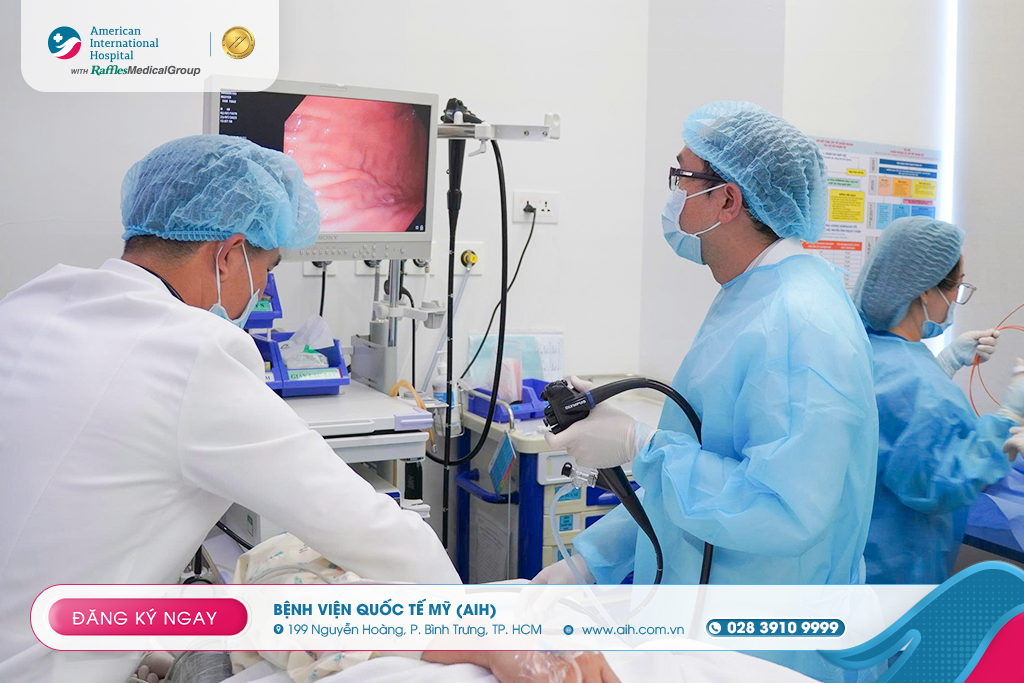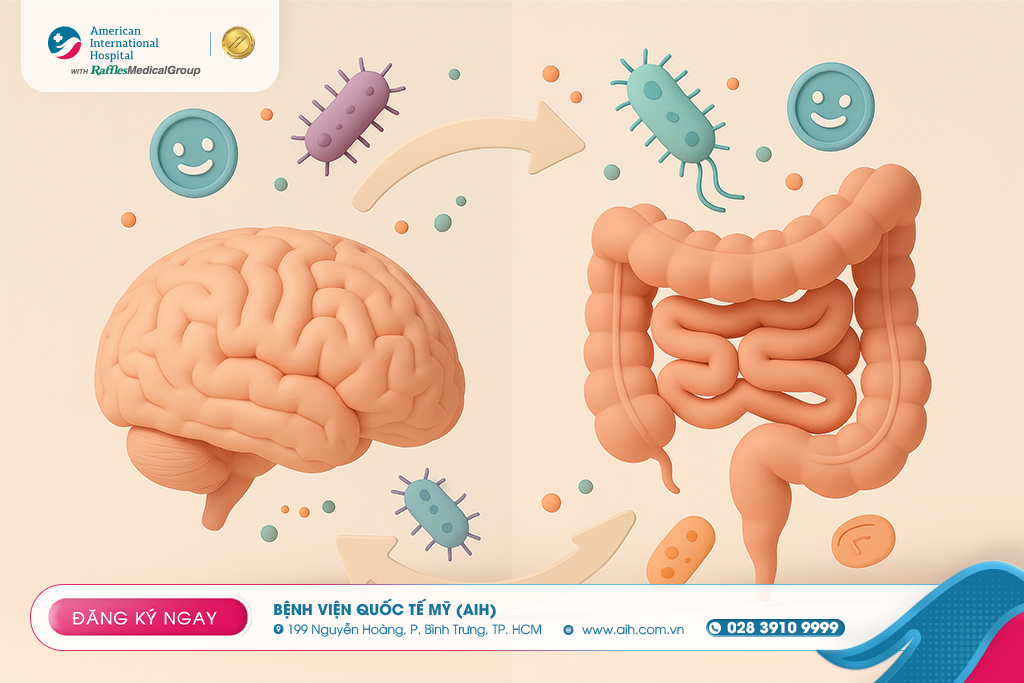Notification
Please fill in the information below
Urgent
GUT–BRAIN CONNECTION: THE KEY TO MAINTAINING HEALTH AND EMOTIONAL BALANCE
In recent years, the concept of the “Gut–Brain Connection” has been the subject of in-depth research at leading medical centers worldwide. A wealth of scientific evidence shows that the digestive system is not only where nutrients are absorbed, but is also considered the “second brain,” directly influencing emotions, stress management, and overall health.
In today’s fast-paced lifestyle, stress has become an unavoidable daily challenge. We often think of sports, meditation, and sleep as effective methods of stress management. However, few realize that taking care of the “second brain” in the gut, along with maintaining a healthy daily diet, also plays a crucial role in supporting mental health and emotional balance.
The Second Brain in the Gut
Hidden within the wall of the digestive tract is the enteric nervous system (ENS) – with more than 100 million nerve cells stretching from the esophagus to the rectum. The ENS controls digestion – from swallowing, enzyme secretion, nutrient absorption to elimination – while continuously “communicating” with the central nervous system (CNS).
The ENS can trigger strong emotional changes in people with irritable bowel syndrome (IBS) or functional bowel disorders such as constipation, diarrhea, bloating, abdominal pain, and stomach discomfort. For decades, researchers thought that anxiety and depression were the causes of these problems. But more recent studies have shown the opposite: stimulation in the digestive system can send signals to the central nervous system (CNS), causing mood changes.

This helps explain why the rates of depression and anxiety are higher than normal in patients with IBS and functional bowel disorders. This is significant data, as 30–40% of the population experiences functional bowel problems at some point in life.
This connection explains the reason why:
People with irritable bowel syndrome (IBS) often have higher rates of anxiety and depression than usual.
Stress can disrupt bowel activity, causing abdominal pain, diarrhea, and bloating.
Methods such as antidepressants, cognitive behavioral therapy (CBT, medical hypnosis), or probiotics can improve bowel symptoms by regulating communication between the two brains.
The importance of nutrition for the brain and gut
If the body is compared to a sophisticated machine, then stress is like forcing the engine to run at high speed continuously. For this machine to operate well, it needs the right “fuel”: a nutrient-rich diet.
Food and stress are closely linked through the gut microbiota – home to trillions of bacteria. When stress is prolonged, the balance of microbiota may be disrupted, causing inflammation and negatively affecting mood.
An anti-stress diet is not about strict rules but a comprehensive approach that nourishes both body and mind:
Complex carbohydrates: oats, brown rice, quinoa – help maintain stable energy and prevent blood sugar drops that cause fatigue and irritability.
Lean protein: fish, poultry, milk, beans, lentils, tofu – provide the building blocks for serotonin and dopamine, the hormones that create a sense of calm.
Healthy fats: salmon, avocado, nuts, olive oil – especially omega-3, which helps reduce inflammation and improve mood.
Vitamins & minerals: vegetables, fruits rich in B vitamins, magnesium, vitamin C – boost immunity and regulate the stress response.
Probiotics: yogurt, kefir, pickled mustard greens, kimchi – support microbiota balance and improve mood.
Water: staying hydrated, preventing dehydration, since dehydration symptoms can easily be mistaken for stress (fatigue, headache).

On the other hand, processed foods, carbonated soft drinks, excessive caffeine, or alcohol can increase inflammation, cause blood sugar fluctuations, and make it harder for the body to cope with stress.
Gut-Brain Collaboration: Maintaining Emotional and Physical Balance
Understanding the connection between brain – gut – nutrition – stress helps us approach health care more comprehensively:
Stress management does not rely solely on rest and exercise but also depends on food and daily diet.
A healthy gut means better recovery and adaptability in the face of mental pressures.
Many patients with digestive disorders also simultaneously face psychological problems such as depression or anxiety. Therefore, effective treatment should not stop at addressing individual symptoms but must combine gastroenterology and psychiatry, acting simultaneously on both “brains.” When both the brain and the gut are cared for simultaneously, treatment outcomes become more comprehensive and sustainable.

In summary, the gut and brain are not separate but a closely interconnected network. Diet, emotions, living environment, and social relationships all simultaneously affect both physical and mental health. To maintain balance, each person needs to nourish both “brains” through healthy nutrition, stress management, and building positive connections in life.
Specialized Digestive Care at American International Hospital (AIH)
The digestive system is the “first gateway” that determines overall health: from nutrient absorption and immune strength to mental well-being. Understanding this, American International Hospital (AIH) has developed digestive diagnosis and treatment services based on a multidisciplinary, modern, personalized model.
Specialized medical team: Highly experienced in treating stomach, intestinal, hepatobiliary, pancreatic diseases, and gut microbiota disorders.
Advanced, minimally invasive endoscopy system: Enables early detection of lesions, even before patients show clear symptoms.
Modern gut microbiota and inflammatory marker testing: Analyzes beneficial and harmful bacteria, detecting microbiota imbalances related to digestion, immunity, and neuropsychiatry.

Modern gut microbiota and inflammatory marker testing is an advanced tool that provides an accurate assessment of the gut microbiota balance. By analyzing the ratio of beneficial to harmful bacteria, the test can detect dysbiosis, which is closely associated with mechanisms such as:
Digestion: affects the ability to absorb nutrients, secrete digestive enzymes, and regulate intestinal peristalsis.
Immunity: the gut is the center of immune regulation; microbiota imbalance can trigger inflammatory responses or weaken immunity.
Neuropsychiatry: the gut microbiota interacts with the “second brain,” influencing emotions, stress, sleep, and neuropsychiatric disorders such as anxiety and depression.
Thanks to this, the test not only helps diagnose the causes of digestive disorders but also predicts the risk of inflammation, assesses overall health, and guides nutritional interventions, probiotics, or personalized medical therapy. This is an important step forward in personalized medicine and comprehensive healthcare.
Personalized regimen: designed based on microbiota analysis and each patient’s characteristics, helping to restore the gut–brain axis scientifically and safely.
Specialized counseling on nutrition, psychology, and lifestyle: supporting patients to change eating habits, behaviors, and to manage stress effectively.
Interdisciplinary connection: close collaboration among Gastroenterology, Psychology, and Nutrition specialties ensures a comprehensive and sustainable approach.
Understanding and caring for the gut–brain connection is not only the key to maintaining digestive health but also the foundation for emotional balance and overall well-being. By combining a healthy diet, stress management, balanced lifestyle, and advanced screening and treatment, each person can nurture both the “second brain” in the gut and the central brain, reducing the risk of digestive disorders and mental health problems.
At American International Hospital (AIH), with its multidisciplinary model, advanced technology, and personalized regimens, patients receive comprehensive care along the brain–gut–microbiota axis, helping to restore health scientifically and sustainably. Proper care today is an investment in both long-term physical and mental health, building a solid foundation for a balanced and fulfilling life.
Reference:
Search
Latest News
Our Doctor






































































Leave a comment